Jungle Safari AKA The Zoo Pat and Robert Engesser
Jungle Safari (formerly known as Engesser’s Exotic Felines, Luce Enterprises, The Zoo, and Endangered Species, Inc.) is a privately-owned traveling petting zoo which spends 9 months of the year displaying big cats and their cubs in the parking lots of malls and shopping centers. Although it occasionally claims to be a “rescue,” owners Pat and Robert Engesser are for-profit big cat breeders who have repeatedly failed to comply with minimal animal care standards established in the federal Animal Welfare Act.
USDA inspectors have cited Jungle Safari numerous times for repeatedly failing to provide animals with appropriate food, water, veterinary care, and enrichment, failing to maintain enclosures and transport trailers, and housing animals in filthy cages. They have also been cited for exhibiting animals with zoonotic (transmissible to humans) diseases, for the death of a tiger cub, and for the injury of a 5-year-old girl who was attacked by a leopard.
PETA Alerts Authorities to Jungle Safari’s Interstate Receipt of 4-Week-Old Neonatal Tiger Cub
June 15, 2017
PETA has sent a complaint to the U.S. Department of Agriculture (USDA) concerning Jungle Safari, a traveling zoo based in Trenton, which apparently arranged for the interstate transfer of a 4-week-old tiger cub—who was forcibly and prematurely separated from her mother—in apparent violation of the federal Animal Welfare Act.
According to a certificate of veterinary inspection issued to the notorious Greater Wynnewood Exotic Animal Park (aka “G.W. Zoo”) in Oklahoma, Jungle Safari arranged for the tiger cub’s transfer from G.W. Zoo. USDA policy acknowledges that neonatal cubs (baby animals 4 weeks of age or younger) are not able to regulate their body temperatures and have an underdeveloped immune system, placing them at risk of disease and infection.
Jungle Safari also apparently arranged for the transfer of a 5-week-old tiger cub—but the destination on the certificate was the Oklahoma shopping mall at which the G.W. Zoo–affiliated Neon Jungle exhibits and sells “playtime” with tiger, bear, and wolf or wolf-dog hybrid cubs and a lemur. PETA is asking the USDA to investigate this transfer.
PETA has also asked the USDA to investigate facilities in Illinois, Oregon, and Wisconsin that have received neonatal big-cat cubs from G.W. Zoo and to investigate G.W. Zoo for transferring these animals. PETA has also asked the USDA to investigate why G.W. Zoo’s veterinarian repeatedly signed off on these transfers and has asked the Oklahoma Veterinary Board to hold her professionally accountable.
For more information, please visit PETA.org.
In 2016, a Jungle Safari employee was arrested for multiple counts of sexually molesting young girls who visited the exhibit. A lawsuit brought against the petting zoo and the shopping plaza they were set up at alleged that Jungle Safari continued to allow this employee to work with children even after his misconduct was brought to their attention.
Note the first cub is only 6 weeks old and not even old enough for her first inoculations to protect her from disease. USDA guidelines say she should still be with her mother until she’s four weeks old. If that had happened she wouldn’t tolerate being touched by humans. She’s clearly stressed and wants to nurse when the keeper tosses in the furry toy. The 10 month old is biting her front paws hard and the videographer notes that back claws are visible, but it looks like she’s been declawed on the front, even though that’s been illegal since 2006. When asked what zoo the cubs are going to the keepers get vague and we are pretty sure it’s because they aren’t proud of the circumstances that await these cubs.
This is what videographers have to say:
Published on Jul 4, 2012 by Sophiaz123
“Tigers need water to cool off in hot weather. This is a horrid Zoo Safari in Hamilton, Ohio in front of Big Lots on Rt. 4, july 4th, the temperature was 100 degrees and VERY humid. Taken at 5pm. Sorry only 9 seconds. Shot a second video but was shakier than this one. I was very upset and trying to hold it together. I am sure the fan on him feels like a hot blow dryers. Disgusting that this Robert Engesser guy calls himself a “traveling zoo” when it’s nothing but Animal Cruelty Galore. From Chiefland, Florida. Google him yourself. Disturbing. He has a camel, monkeys, goats and wild cats. He keeps his cats in cages like this for MINIMUM of 4 weeks. It can NEVER walk around!! Disgraceful. Tigers need to swim to cool off. I saw no water. The police did nothing when I called them. Powerless they said ????”
https://www.facebook.com/OutreachForAnimals/videos/3160931756024/
Tim Harrison of Outreach for Animals filmed this disturbing video at Jungle Safari in 2012. He writes:
“I went there and could not believe what I saw. The big cats, (tigers, a black leopard, and a lion cub) were overheated and panting rapidly. The temperature was 96 degrees (110 heat index) The tigers and black leopard had no comfortable flooring for their small cages. The 8 week old lion cub was being used for photos and passed around to anyone who wanted to touch it. There are too many lions being bred by dealers in the USA just to be used for money making “educational traveling zoos.” Most are destroyed after growing too large. I spoke with the manager of Big Lots where the “zoo” had its tent set up in their parking lot. He said they will not have them back next year. It is up to all of us to stop this cruelty. Please contact the owners of properties where this madness happens and… …ask them to be more humane.”
Animal Cruelty
Jungle Safari exhibits leopards, lions, and other large cats in tiny, hot, barren travel cages for weeks at a time, and constantly breeds tiger and lion cubs in order to sell $15 “photo ops” with little regard for federal laws or animal welfare. When not on the road, the animals are housed in small enclosures on Engesser’s farm in Trenton, Florida.
Jungle Safari has been cited by the USDA for the following violations of the Animal Welfare Act:
USDA License #58-C-0295
It’s impossible to know if there are more recent citations as the USDA is hiding the inspection reports and telling inspectors to “educate” rather than cite violators.
January 5, 2015: The USDA cited Jungle Safari for failure to dispose of expired medication. One of the drugs had expired in December 2009. The inspector noted that “[u]sing expired medication for treatment is not an accepted and appropriate method of veterinary care.”
September 7, 2011: The USDA cited Jungle Safari for putting the public and animals at risk by placing a young lion directly onto the laps of children. The inspector noted that in “all cases,” the zoo attendant had no control over the 11-week-old lion cub and that the practice “could easily result in injury.” Adults were also allowed to hold and handle the cub as well as a kangaroo and a capuchin monkey.
July 12, 2011: The USDA cited Jungle Safari for accumulations of dirt in the food storage and preparation areas, including under and around the freezers, cooler, table, and food containers.
March 18, 2011: The USDA cited Jungle Safari for using a “highly active” 16-week-old tiger cub in public photo sessions. Engesser said that he would be replacing the tiger with another. He was also cited for causing a primate psychological harm by housing a 12-year-old weeper capuchin monkey alone after her mate died. The inspector noted that the monkey had excessive hair loss and observed her biting her tail. There was no environmental enhancement plan—as required for primates—to address her neurotic and abnormal behavior. Engesser refused to sign the report.
February 13, 2010: A 9.5-foot-long python was “stolen” from Jungle Safari after the snake was left caged in a South Fort Myers, Florida, parking lot overnight.
October 26, 2007: The USDA cited Jungle Safari for improper handling of animals. An unvaccinated 6-week-old lion cub was being used for public photo sessions, putting the cub at risk of contracting contagious diseases.
May 25, 2007: The USDA cited Jungle Safari for failure to maintain acquisition records for a water buffalo obtained from a person who did not have a USDA license.
July 13, 2006: The USDA cited Jungle Safari for an incomplete program of veterinary care, which omitted vaccination information for two juvenile lion cubs, dosages of chemical restraint drugs for adult tigers and leopards, names and dosages of deworming medication for all animals, and any records of care for a young kangaroo. The inspector also noted that the two lion cubs being used in photo shoots would soon be too large to be safely handled during direct public contact.
January 23, 2004: The USDA cited Jungle Safari for failure to have a responsible person available so that an inspection could be performed.
May 29, 2003: A USDA inspector recommended that Jungle Safari implement signage advising visitors to wash their hands after touching the animals and to provide methods for doing so. The inspector wrote, “The farm animals are of particular concern, especially the calf.”
February 27, 2003: A USDA inspector noted that Jungle Safari lacked sufficient environmental enrichment for primates.
March 1, 2002: The USDA cited Jungle Safari for allowing children to come into direct contact with animals without supervision during exhibition. For the third time, the USDA cited the facility for failing to develop and implement an environment enrichment plan for primates. The baboon and a lemur were exhibiting stereotypic behavior.
August 22, 2001: During an inspection, the USDA noted that the baboon’s stereotypic behavior was still not being addressed.
May 24, 2001: The USDA cited Jungle Safari for failing to provide environment enrichment to a baboon housed alone or to the ring-tailed lemurs. The baboon was seen pacing and head-rolling. A lion cub was being fed an inadequate diet of goat milk replacer (“photo prop cubs” are often deliberately malnourished in order to keep them small for as long as possible). Water containers for the camel and llama were covered in algae.
August 17, 2000: Jungle Safari was cited for failing to provide proper veterinary care to a tiger cub suffering from metabolic bone disease due to lack of proper diet and to a leopard with several areas of missing hair.
June 28, 2000: During a complaint- based inspection, the USDA cited Jungle Safari for failing to provide adequate food to animals.
November 4, 1999: The USDA cited Jungle Safari for failing to store food to protect against deterioration, mold, or contamination by vermin.
April 30, 1999: Jungle Safari was cited for keeping a tiger cub in a cage in which he was unable to turn about freely and make normal postural adjustments. The exhibit was again cited for failing to maintain proper veterinary records to document that an underweight elephant was receiving proper medical attention.
January 28, 1999: The USDA cited Jungle Safari for failing to provide an inclusive program of veterinary care, including measures to prevent zoonosis. A lion cub transmitted ringworm to other animals and a caretaker. The facility was also cited for failing to keep enclosures and food storage areas in good repair. A dead tiger cub was found in the freezer, having died of an unknown (“probably infectious”) respiratory illness.
July 24, 1998: During a complaint- based inspection, the USDA cited Jungle Safari for failing to maintain enclosures adequate to prevent animals from escaping. The exhibitor was also cited for lack of a proper program of veterinary care.
April 24, 1996: The USDA cited Jungle Safari for failing to maintain transport enclosures in good repair.
November 7, 1995: Jungle Safari was cited for improper storage of supplies, for failing to maintain enclosures in good repair, and for a lack of proper water sources for three leopards.
May 20, 1995: In a letter to the owners of Jungle Safari, the attending veterinarian noted observations that the big cats were overweight and stated that a leopard’s tail had to be amputated.
May 15, 1995: Jungle Safari was cited for failing to maintain enclosures in order to prevent injury to animals.
March 2, 1995: The USDA cited Jungle Safari for housing goats, sheep, and llamas in enclosures in which they could not make normal postural adjustments. It was again cited for failing to provide enrichment to a baboon who was constantly pacing and picking at her skin—a sign of zoochosis. There was also no record of veterinary care, and an elephant was observed to be thin.
October 12, 1994: The USDA cited Jungle Safari for failing to store food in order to prevent contamination and to maintain transport containers in good repair.
June 10, 1994: Jungle Safari was cited for failing to store food properly to prevent contamination. The baboon was exhibiting stereotypic behavior indicative of zoochosis.
March 8-11, 1994: During this inspection, the USDA cited Jungle Safari for failing to maintain enclosures in good repair and for failing to store bedding to prevent contamination. A male tiger was noted as underweight and suffering from a lame paw. Jungle Safari staff was not able to provide records to account for the whereabouts of all animals. Enclosures and perimeter fencing were noted to be inadequate to safely contain animals. The camel’s water source was found to be filled with algae and silt.
February 11, 1994: The USDA cited Jungle Safari for failing to implement an environment enrichment program for primates, and the lemurs did not have access to a den to which they could retreat from the public. Food was noted to be stored in a manner in which it could become contaminated, and enclosures were noted to be in disrepair.
May 11, 1993: The USDA cited Jungle Safari for housing lemurs, lions, and tigers in transport containers.
August 9, 1990: According to the Rapid City Journal, a leopard attacked and mauled a 5-year-old girl while on display at the Black Hills Motor Classic in South Dakota. Reportedly, the leopard, who was restrained with a small chain fastened to a box, leaped on the girl’s back as she walked past him.
Cub Abuse
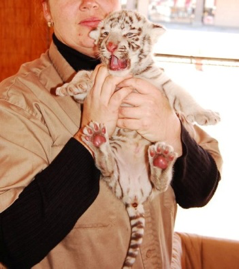
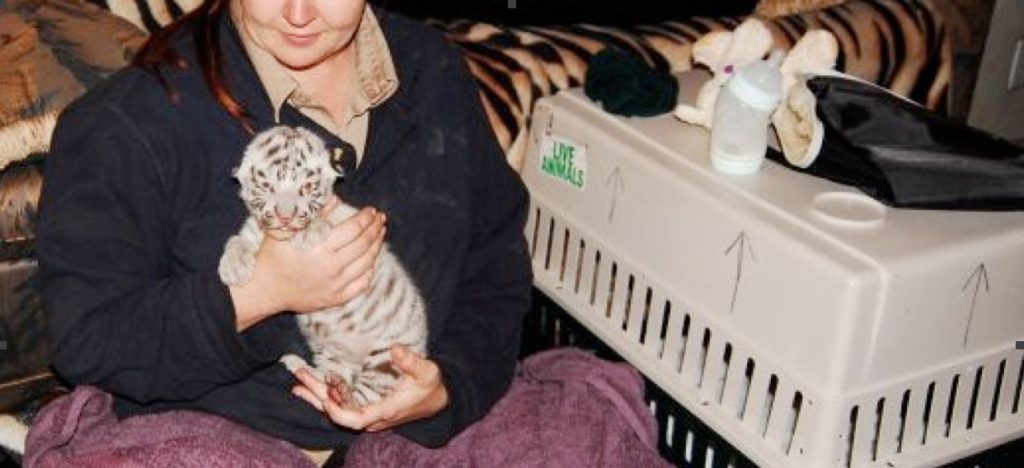
On exhibit, the cubs are used as photo props, constantly handled by the public, and placed in the laps of children, even when they are too exhausted to hold their heads up.
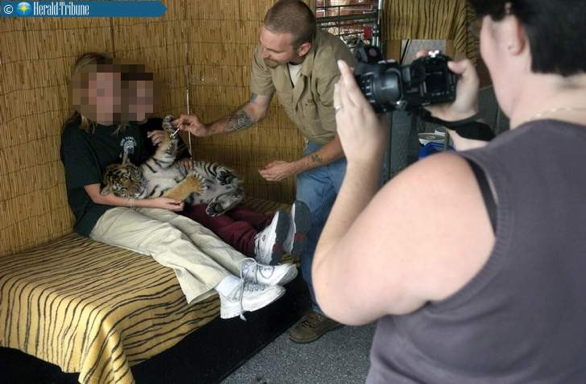
Because Jungle Safari uses inbreeding in an attempt to create white tigers, many of the cubs are born with genetic deformities such as crossed eyes. These animals are sometimes kept as “breeders,” resulting in generation after generation of damaged cubs.
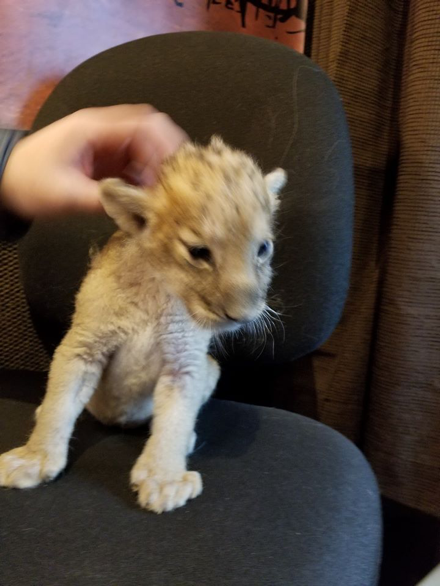 Occasionally, Jungle Safari buys newborn cubs from breeders in other states. In June 2017, a certificate of veterinary inspection issued to the notoriously abusive G.W. Zoo in Oklahoma revealed that Jungle Safari arranged for the interstate transfer of a 4-week-old tiger cub, who was forcibly and prematurely separated from her mother, in apparent violation of the federal Animal Welfare Act. USDA policy acknowledges that neonatal cubs (4 weeks of age or younger) are not able to regulate their body temperatures and have an underdeveloped immune system, placing them at risk of disease and infection.
Occasionally, Jungle Safari buys newborn cubs from breeders in other states. In June 2017, a certificate of veterinary inspection issued to the notoriously abusive G.W. Zoo in Oklahoma revealed that Jungle Safari arranged for the interstate transfer of a 4-week-old tiger cub, who was forcibly and prematurely separated from her mother, in apparent violation of the federal Animal Welfare Act. USDA policy acknowledges that neonatal cubs (4 weeks of age or younger) are not able to regulate their body temperatures and have an underdeveloped immune system, placing them at risk of disease and infection.
In 2017, Jungle Safari brought this tiny lion cub to a local radio station. Not only should this cub still be with his mother, he appears to be thin with a scruffy coat.
Where do the cubs go?
Once cubs are too large for the public to handle, Jungle Safari sells them and replaces them with new cubs. Nobody knows where the majority of these cubs end up, but it is known that the owners of Jungle Safari have known connections with notoriously abusive private zoos and circus trainers, including Joe Schreibvogel Maldonado Passage, Vincent Von Duke, Kathy Stearns, Brian Staples, Josip Marcan, “doc” Antle, Lynn Culver, and Felicia Frisco.
In January 2005, the owners of Jungle Safari advertised lion cubs for sale in Animal Finders’ Guide, a (now defunct) trade publication for private exotic animal breeders and dealers. Later that year, a Hernando Today article interviewed Pat Engesser at an exotic-animal auction in Florida. Engesser, described as a big cat breeder for 30 years, said that she attended the auction with the hope of selling lion cubs to other breeders. Animals sold at such auctions often end up at canned hunts, in the “pet” trade, or at poorly run roadside zoos.
Jungle Safari is known to have sold cubs to the notorious “Hovatter’s Wildlife Zoo“, a roadside menagerie in West Virginia that has shown repeated contempt for federal regulations.
These lion cubs were sold by Jungle Safari to the notoriously abusive DEW Haven, where they were kept in the living room of a house.
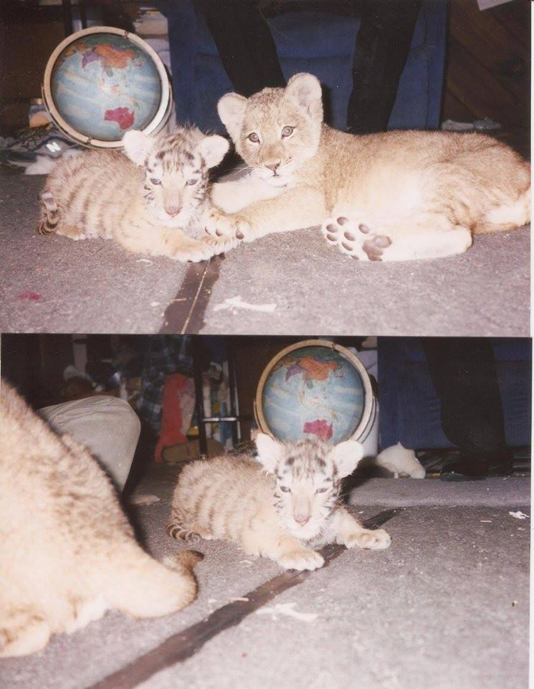
Around 2015, this lion cub with a severe case of ringworm was sold by Jungle Safari to an undisclosed buyer.
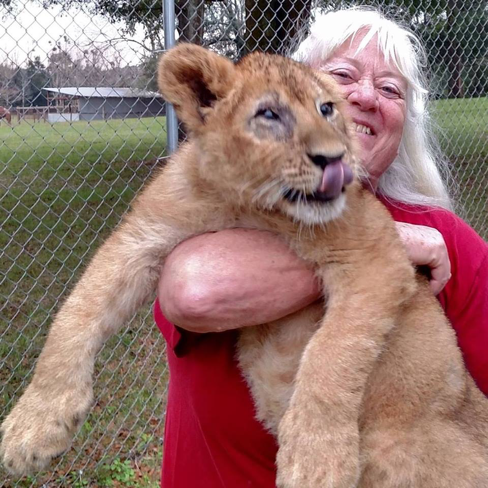
A History of Abuse
The company that would become Jungle Safari was founded in 1968 by Roxy (Luce) Engesser, a circus trainer who decided to make a living breeding exotic cats for zoos and traveling the country to sell photos with the cubs. By 1984, “Engesser’s Exotic Felines” had a whopping 286 breeding big cats on lease to other private exhibitors nationwide, according to an Ocala Star-Banner report about Engesser’s plans to build a “retirement home” for her animals in a residential Levy County subdivision. In the article, Mrs. Engesser made the dangerous (and false) claim that “these aren’t wild cats, they’ve been hand raised. After about 10 generations in captivity, these animals even lose the instinct to kill their prey.” When Roxy passed away, the family big cat business was left in the hands of her son, Robert, and his wife, Pat.
Two Cats Who Were Abused and Abandoned by Roxy Engesser
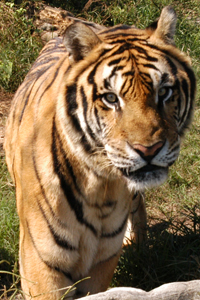
Snorkle Tiger
Snorkel Tiger was bred in 1996 by Roxy Engesser, the same abuser who bred Nakoma the lion. She breeds lions and tigers and uses them to make money by selling you a photo of you holding a cute little cub. Typically these cubs are starved, deprived of bone building calcium and even poisoned to give them constant diarrhea so that they cannot gain weight. They do this because the cubs are only profitable while they are small. Once they reach 45 pounds they cannot be touched by the public, according to FL state law, and then they are discarded.
Snorkel was given to a small family operated circus when he exceeded 45 pounds at the age of 6 months but because he had been so deprived of nutrition he was very tiny and stands on little stunted legs. The other bigger circus tigers beat him up and one bit him across the nose so severely that when he chuffs it sounds like he is drowning, thus his name. He has never had soft grass to roll in nor a pool or mountain cave to call his own before going to Big Cat Rescue.
Nakoma Lion was used as a photo prop by the owners of Jungle Safari. He was purposely starved, deprived of vitamins and calcium, and kept in a small concrete space. Hardly conditions fit for a king.
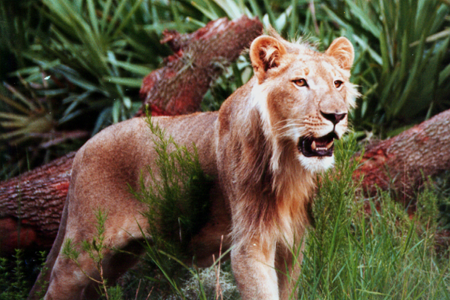
Nakoma Lion
That’s when Big Cat Rescue stepped in and purchased young Nakoma at a livestock auction. Imagine that, the “king of beasts” being auctioned off. Nakoma was so crippled in the hind legs and so malnourished that no one wanted him and he was sold for only $200. (Big Cat Rescue stopped paying to rescue animals in the ’90s)
Only a year earlier this little lion cub was being pimped out as a photo prop. His owner (Engesser) made money by selling people the opportunity to have their photograph taken with the cute and cuddly lion cub. In the state of Florida, however, it is against the law to allow contact with a big cat over 45 pounds. So Engesser purposely starved him and deprived him of vitamins to keep him under the weight limit. As a result of this deficiency, Nakoma developed paralysis in his hind legs. Crippled, unwanted and abused, he was found with gaping gashes in his body that had become infested with maggots. Yet despite all this, he was still a very lovable, talkative cub.
Big Cat Rescue took Nakoma into their care. But after a year and a half of proper nutrition and supplements, he was still having an increasingly hard time moving his back legs. It took him two hours just to walk across his pen by dragging himself with his front paws. X-rays, a spinal tap and MRI all came out negative, meaning that Nakoma’s paralysis had most likely been caused by the thiamine deficiency he endured.
On July 12, 1998, during his MRI, Nakoma tragically stopped breathing and died. His quiet passing may have been a blessing in disguise since nothing could be done for his crippled body. In fact, the vets said his condition would have continued to deteriorate until he could not move at all.
Today, Nakoma rests in a grave on the site, adorned with his proud picture. This brave little king will never be forgotten and everybody can take solace in that Big Cat Rescue was at least able to make his last years a little better.
News Coverage
Roadside zoo sparks protests, second thoughts
Sarasota Herald-Tribune
Posted Jan 19, 2007 at 3:24 AM
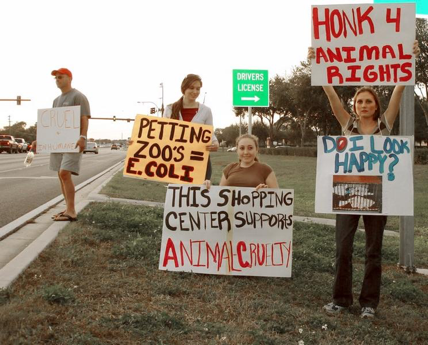
I saw the tent being pitched and anxiously waited to see the wonderful animals that would soon be on display in South Venice.
Traveling zoos remind me of being a youngster and visiting the zoo with my parents and siblings. It was a day trip that we always looked forward to as children. Later, when I had my own children, I made sure we took similar trips at least once a year to see the animals and give my kids the same experience.
So when the Jungle Safari pulled into town, I was ready to relive the fond memories I had of those days. What I saw instead on repeated visits saddened me.
Maybe I was seeing with different eyes, but the wonderment of it all was gone.
A realization hit me that a traveling zoo is not the same as a zoo at all.
I saw large animals that were unable to run, raise their heads up and in one case, unable to turn around at all in their cages.
Some were standing in their own feces because they had nowhere else to go.
I saw a tiger cub repeatedly return to an empty water dish while several other cages had no water dish at all.
When David Hadley, 44, saw the roadside traveling zoo at the Venice Village Shoppes at U.S. 41 and Jacaranda Boulevard, he traded in his beach and house-hunting time for some protest time.
Creating a makeshift sign out of foam board, the Army veteran stood at the roadside garnering support from fellow animal lovers.
Among the honks of approval, however, were shouts of profanity and displays of obscene gestures. Hadley, a former airborne combat medic in the Army, stood firm.
“I have a right to protest, it’s a freedom of speech and I earned that right,” said Hadley, who suffers from a painful hip. With his walking cane and Luna, his rescued border collie mix, Hadley remained undaunted.
The Jungle Safari traveling zoo is owned and operated by Robert Engesser.
“It was my parents’ zoo, and now it is mine,” said Engesser, referring to the original owners as the Luce family.
Soon Hadley was joined by Englewood sisters Nicole Miers, 17, and Tiffany Miers-Pandolfi, 21.
Later, Venice MCC student Monica Moore, 18, joined the group with her own homemade sign.
“I’m a big animal lover and I don’t like to see animals trapped unfairly. They deserve a chance to be in their own habitat and have a happy life,” Moore said.
A state wildlife inspector visited the setup in South Venice and found no violations.
For nearly 11 months out of the year, the animals travel from parking lot to parking lot throughout the South.
A typical day requires them to stand from 10 a.m. to 9 p.m. in small cages directly on pavement.
Engesser acknowledged that the protesters had a right to share their feelings but defended the zoo’s ability to expose kids to exotic creatures.
“I believe that the protesters are entitled to their opinion. But it’s a chance for kids to see animals they wouldn’t otherwise see. It’s a family thing. The protesters just don’t like to see animals in cages and they don’t like to see them spend their lives like that,” Engesser said.
Well, maybe.
But not so for North Port protester Holly Carver, who also joined the group objecting to the roadside menagerie.
“I do support zoos, but this is a whole different thing. I don’t believe it’s right for animals to be traveling in small environments. They can’t move around. It’s not much of a life for them,” Carver said sadly.
In his defense, Engesser added, “We are taking and raising these animals from babies, and they are used to captivity. They are used to it and comfortable with it. It’s not like we are taking them from the wild and putting them in captivity. They don’t have that stress factor.”
Maybe not, except for one small cub who had a noticeable mark on his forehead. A caretaker said the cub had been banging its head against its cage again and again.
“I’m here as a moral decision to stop the cruelty that the animals are subjected to. In 2007, it’s just unacceptable in our society,” said Hadley.
Pony ride worker accused of inappropriately touching children
By Tom Smith
Senior Staff Writer, Florence Times-Daily
Apr 30, 2016
 FLORENCE — A man working at a traveling petting zoo with the pony ride has been arrested and charged after police said he inappropriately was touching little girls who were riding the animals.
FLORENCE — A man working at a traveling petting zoo with the pony ride has been arrested and charged after police said he inappropriately was touching little girls who were riding the animals.
Police Sgt. Brad Holmes said Daryl V Raymond Jr., 48, of Stockholm, Maine, has been charged with two counts of sexual abuse of a child under 12.
Holmes said police were notified of the allegations Friday while detectives were investigating a homicide.
Reports indicate while the sexual abuse case was under investigation, a second victim came forward.
Police said Raymond was taken into custody Saturday morning at the petting zoo, which had set up operations in the Big Lots Shopping Center on Darby Drive.
Authorities said Raymond was picked up without incident, interviewed, then arrested and charged.
Police Detective Keith Johnson said Raymond was an employee of Jungle Safari, which is based in Chiefland, Florida.
He said after the investigation and arrest of Raymond, the owner of the petting zoo was closing his operation and leaving the area.
According to reports, since Raymond’s arrest, three more reports of similar incidents have been made to police.
Police said two of the incidents are supposed to have happened Thursday and three Friday. The victims are all young girls between the ages of 3 and 5.
Investigators said Raymond was working the pony ride and, according to allegations, he would have his left hand on the pole that guided the pony and his right hand on the saddle horn where the victims were sitting. During the ride, while he was walking with the pony, he would inappropriately touch the girls, police said.
Johnson said the first incident was reported Friday after a young girl told her family what happened and the police were notified.
Authorities said after reporting the incident, a family member put a post on social media about what had happened, and other incidents started being reported.
Raymond has denied the allegations.
More charges are pending as the case continues.
Sexual abuse of a child under 12 is a Class B felony, which is punishable by 2-20 years in prison.
Raymond is being held in the Lauderdale County Detention Center on bond of $100,000.
Petting zoo employee now has 5 child sex abuse charges in Alabama
Posted May 2, 2016
By Jonathan Grass, AL.com
A man already accused of sexually abusing two children who visited the traveling petting zoo where he works now faces additional charges.
Daryl V. Raymond Jr., 48, of Stockholm, Maine was arrested in Florence on Saturday.
He worked for Jungle Safari, a Florida-based petting zoo that travels to malls, fairs and festivals across the country, according to its website.
He was originally charged with two counts of sexual abuse of a child under the age of 12. Police say two children who visited the petting zoo came forward with accusations.
On Monday, Raymond was charged with three additional counts of sexual abuse of a child under the age of 12. He is in the Lauderdale County Detention Center on bonds totaling $250,000.
Five victims have come forward so far, and additional charges are pending, Sgt. Brad Holmes said.
Jungle Safari’s owner told Florence police that he planned to move the petting zoo to another city ahead of schedule. Holmes said the owner has cooperated fully throughout the investigation, which is ongoing.
Traveling zoos, carnivals only need business license
By Jennifer Edwards, Florence Times-Daily
May 3, 2016
FLORENCE — A simple business license is the only permission a traveling show needs in three of the four Shoals cities, but Florence officials are reviewing their process in the wake of a child sexual abuse case.
Obtaining a business license is the only requirement Jungle Safari had to meet before setting up a free petting zoo in a Darby Drive parking lot. An employee of that outfit, Daryl V. Raymond Jr., was arrested Saturday and charged with two counts of sexual abuse of a child under 12.
Florence Police Chief Ron Tyler wants to take another look at the business license requirement.
“When I talked to (Florence Mayor Mickey Haddock) Saturday to inform him about what was going on, he said then that, at the first opportunity, to get with the city attorney and look at making changes to the ordinance that governs those businesses,” Tyler said Monday.
“We want to look at the cost of temporary business licenses — businesses that are not going to make a permanent home here.”
Tyler said city officials would not prohibit temporary business license issuance to companies that come into Florence to do fundraisers for Shoals-based agencies or groups. He said scrutiny would be especially close on businesses such as the petting zoo traveling show.
“These companies are coming in with employees who may or may not have had background checks,” he said. “That is up to the employer.”
Raymond, 48, of Stockholm, Maine, is accused of inappropriately touching young girls while he was operating the pony ride at Jungle Safari. Chief Assistant District Attorney Will Powell said at Raymond’s initial court appearance Monday more charges are likely after three additional complaints were made. Raymond has been detained without bond in the Lauderdale County Detention Center pending a bond hearing scheduled for Friday.
“As a result to what happened Saturday, we are going to do some research into other cities as to how they handle temporary business licenses and see what we can do to strengthen some of the protection for our citizens,” Tyler said. “You just can’t have unknown people coming in with unknown backgrounds.”
Florence spokesman Phil Stevenson said if a vendor does not require a utility connection, the only permit necessary is a business license. The city’s simple business license is $75. Vendors selling wares pay a business license fee in proportion to anticipated sales.
Tyler said there is a reason authorities acted quickly Saturday when the allegations surfaced.
“We knew the petting zoo was not going to be here long and once he was gone, he would be gone,” Tyler said. “Hopefully this will never happen again. We’re trying to make sure it never does.”
Jungle Safari closed and left Florence on Saturday.
The latest United States Department of Agriculture inspection report shows Zoo/Jungle Safari is based in Chiefland, Florida, and is operated by Robert Engesser. A USDA inspection, performed March 17, 2016, when the traveling show was set up in Graceville, Florida, shows Jungle Safari had exotic animals including tigers, a camel, a kangaroo and several primates, goats, llamas and a cow or ox.
Obtaining a license for traveling vendors is fairly routine. In Florence, if a utility connection is required to operate lights, signs or rides, the city inspects the connection to ensure the work was done properly and safely, Stevenson said.
Tuscumbia requires a business license and requires fire-rated tents be used, according to city Building Official Luster Echols.
Sheffield requires a $100 flat fee for its privilege license, which is good for 10 days. In the case of a carnival, if there are peripheral vendors not associated with the carnival itself, each one would pay $10 a day to the city. The $100 flat fee is waived if it’s a nonprofit. Sheffield issues one privilege license every 120 days for the same vendor.
Muscle Shoals is the strictest among the four Shoals cities and imposes regulations on temporary vendors that go beyond a simple business license. Revenue Clerk Rebecca Barnett said a business license is required for anyone setting up in Muscle Shoals, but to obtain one the vendor must rent a suite or storefront at the location, have utility service turned on using the name of the operator, and have functioning restrooms.
Barnett said carnivals previously have set up in shopping center parking lots, but could not recall one recently.
Tyler said he is meeting with the Florence city attorney this week to discuss the ordinance governing temporary businesses.
“We can’t tolerate, never again, someone endangering our children,” he said.
Lawsuit filed in Lauderdale County against petting zoo & employee accused of sexual assault
Posted 2:52 pm, December 5, 2016, by Carter Watkins, WHNT19 News
FLORENCE, Ala. – A civil lawsuit has been filed against the owners of a petting zoo, who employed a man accused of inappropriately touching several small children. The lawsuit has been filed in Lauderdale County Circuit Court.
The 10-page complaint was filed on behalf of three sets of parents, whose children were allegedly touched by Daryl Raymond while he was working for Jungle Safari.
The complaint names Engesser’s Exotics, the parent company of Jungle Safari, the Florence Plaza, and Daryl Raymond as defendants.
The Florence Plaza is named as a defendant because according to the suit, they used the petting zoo as a promotion to get more shoppers to visit.
The plaintiffs state Jungle Safari and Florence Plaza should have known Raymond’s history and practice of assault, and in particular, sexual assault of minor children.
The suit claims Raymond touched three children on the dates of April 28th and 29th.
According to Florence Police, Raymond was working on a pony ride at Jungle Safari at that time.
In August, a Lauderdale County grand jury indicted Raymond on six counts of unlawful sexual abuse of a child under the age of 12.
The lawsuit goes on to say, Jungle Safari continued to allow Raymond to operate the pony ride after a complaint was brought to their attention on the 28th. The suit said two more victims were sexually assaulted on April 29th.
The plaintiffs are seeking damages to be determined by a jury.
According to Florence Police, there were a total of six victims Raymond is accused of touching.
Raymond is set to stand trial on criminal charges next spring. Dates for the civil suit to be heard have not been set. Raymond remains in the Lauderdale County Detention Center on bail totaling $300,000.
Traveling exhibit of exotic animals stops in Bryan
By Brooke West, The Bryan Eagle
Dec 1, 2012
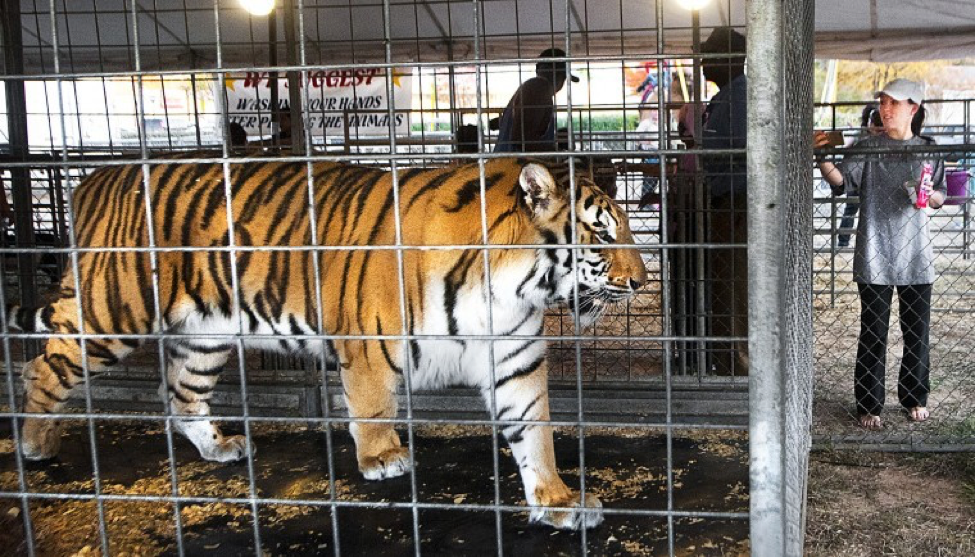
It’s a zoo in Bryan this week.
Jungle Safari, a free exotic animal exhibit, set up in the 3700 block of Texas Avenue on Wednesday and will stay until Sunday at 5 p.m.
Mathilda, a four-year-old kangaroo, shoved her nose through a wire square, giving passersby a curious sniff. Empress the three-year-old Bengal tiger — all 425 pounds of her — slept soundly in her cage. A tiny but busy Zeus, a 9-week-old Bengal tiger cub, circled behind a fence, purring and nuzzling against the warm hands of caretakers who reached in to pet his fuzzy head.
The owner and manager of Jungle Safari, Robert Engesser, said he’s glad to be in Bryan for the first time.
“This enables us to share these guys with the public,” Engesser said, gesturing toward the monkeys, lemurs, goats, ponies, and the camel on display.
Engesser said the traveling zoo provides a chance for people in areas that don’t have permanent exhibits to see, learn and interact with the animals.
Engesser has been showing his variety of animals across the United States for 31 years, he said. He and his crew of handlers and caretakers are on the road for nine and a half months out of the year. The other two and a half months are spent on his land in Chiefland, Fla.
Admission to the exhibit — equipped with eight goats, one cow, two llamas, one camel, three ponies, one spotted mule, two monkeys, two lemurs, and two tigers — is free. There is a cost, however, to ride the camel or ponies, feed the animals or take pictures with them. There is also a white tiger and black leopard on display for a $1 charge.
Engesser said the free admission is “doing it the old-fashioned way.” He said the profits made through pictures, feeding and rides pays all of the employees and allows them to keep the exhibit on the move.
Dealing with large exotic animals safely, Engesser said, is a matter of their weight.
“You have to know what you are doing,” he said. “Size dictates how they should be handled. We want to protect the public from the animal and the animal from the public. These are still wild animals.”
The full-grown Bengal tiger was raised in captivity, Engesser said, and has grown up “socialized.”
“Anytime an animal is on display and confined, there is not a stress factor,” Engesser said. “Inevitably you will have the extreme view. There are a number of ways to be raised healthily in captivity.”
Engesser said his grandparents and parents were operating the traveling zoo before him.
Growing up, he hated it, he said. So he decided to be a mechanic instead.
“I wanted to get away from it so bad,” Engesser laughed. “Then I found out that’s work, too. I figured I might as well come back to what I love if I was gonna have to work anyway.”
In order to operate such a business, Jungle Safari must have an exhibitor license through the U.S. Department of Agriculture. Engesser also had to acquire a special event permit from the city of Bryan.
Dave Sacks, spokeswoman for the USDA, said the goal of licenses is to enforce the Animal Wellness Act.
“The act is a federal set of care standards that must be met for facilities with certain types of animals,” Sacks said. “We put them on unannounced inspections to see how they are treating their animals.”
Sacks said that anything not in compliance with general USDA guidelines is cited, and the operator is given a timeframe in which to correct the problem.
“It can be anything from a hole in the hippo’s cage, to a giraffe with a broken leg,” Sacks said. “It can really run the gamut.”
Regulations set by the organization are not specific, Sacks said. For instance, cage size standards are not determined for each animal, but should be large enough for the animal to move about freely.
“The bottom line is ensuring the welfare of these animals,” Sacks said. “The responsibility falls to them. These folks do what they need to do, and we do what we need to do to ensure the animals are healthy.”
Sacks said Jungle Safari’s last 11 inspections were “pretty clean.”
According to the USDA, the zoo was issued a warning letter on March 8, 1994, and a civil penalty of $250 on May 24, 1999.
Sacks could not detail the nature of the penalties because the cases are outdated.
People for the Ethical Treatment of Animals has several citations to Jungle Safari listed on their website, but Sacks did not confirm that they are consistent with USDA records.
According to PETA, the March 8, 1994 infraction was for failure to maintain enclosures and failure to store bedding to prevent contamination.
There was not an entry in PETA’s records for the May 24, 1999 civil penalty.
Engesser said he thinks Jungle Safari has a “decent record” in all its 31 years.
He said there was an infraction in the past for improper food care for the animals, but the organization was in the process of building a new food housing system at the time.
“[The USDA] wants to oversee the animals’ health and welfare, Engesser said. “I think we’ve done a good job of that.”
When the animals aren’t on the road, he said, they have open spaces to roam back home in Florida.
He said he has a close relationship with two vets he consults with often to ensure the health of the animals.
A pair of sisters, 11-year-old Caitlyn and 8-year-old Ashlyn Seal, lit up as they stopped to gaze at each animal.
“It’s pretty cool,” Caitlyn said. “When we went to feed the goats we put the money in [the machine] and they all came right to it!”
Ashlyn said her favorite part was riding the 2,000 pound camel.
Their mom, Julie Seal, said she wanted to bring her daughters after hearing about the exhibit on the radio. She was especially excited about them getting to ride the camel.
“I remember riding one at a circus when I was little, so I wanted them to do it,” Julie said. “I do feel bad that the animals are kind of in cages but they’re so cute. It’s hard not to want to look at them.”
Engesser said there will be a public feeding Saturday at 7:30 p.m., where anyone is welcome to watch the exotic animals be fed. There will also be a lecture about the animals, he said.
2011 Fox News Charlotte Report on USDA Violations
MONROE, N.C. – From the tame and the typical to totally wild. The traveling petting zoo called Jungle Safari has a little bit of everything, all in the parking lot of Monroe Crossing mall. A mom of two boys says, “I think it’s cool, we were just driving by and like, free admission, why not?” And 11-year-old Zack Weilage says, “Animals are amazing!”
There are tigers, there are camels, there are lemurs and there is a USDA inspection report from March. It levels two concerns, first: a 16-week-old “highly active” tiger cub used for pictures with the public. “‘Too rambunctious’ is actually what she (the inspector) said,” says the zoo owner Robert Engesser.
The inspector noted her concern that the cub couldn’t be controlled in a way that would keep him and the public safe. Engesser replaced the cub with a nine and a half week old lion.
The other issue: a capuchin monkey. The report lists hair loss and tail biting; signs of psychological distress. The zoo had not documented the steps it was taking to address the monkey’s neurotic behavior, often caused by a lack of interaction. The report says her mate died two months ago. Engesser says, “There’s quite a bit of interaction.”
Engesser has owned the traveling zoo for about 13 years. He appealed the March inspection, was denied, and says he will appeal again. He says, “I don’t feel in that situation they were correct, but they’re entitled to their opinion just like I am mine.”
Engesser says he has 30 big cats at his permanent facility in Florida. He rotates which ones are on tour. The two-year -old female tiger currently with him will stay inside her cage for four weeks before returning to Florida.
“It seems fun and it seems great for the kids, but in reality, it’s not, especially not for the poor animals in there,” says Monroe resident Felicia Kiker. She didn’t like what she saw at the petting zoo. “The animals are all in little cages, animals which are supposed to be in the wild,” says Kiker.
Engesser expects between five and six thousand visitors through the weekend. He insists all of the animals are well taken care of and that public safety is his priority. He says, “If we feel it’s a danger to the animal as well as the public, we’re not gonna use it.”
The USDA has inspected the zoo eight times in the last three years. The March report is the only one with citations. Mall management wasn’t aware of the March inspection until FOX Charlotte brought it to their attention. They tell us, “Jungle Safari approached us about operating at Monroe Crossing and we offered them the space free of charge because we knew it would be a great attraction for the community.”
Note: Thankfully the belief that such abuse is good for business is an outdated opinion.


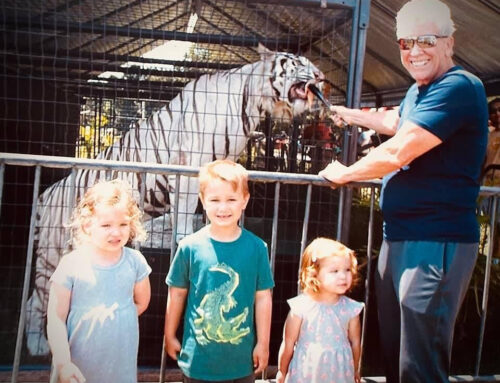
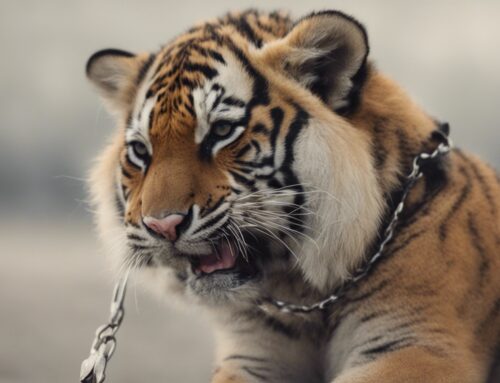

Leave A Comment
You must be logged in to post a comment.